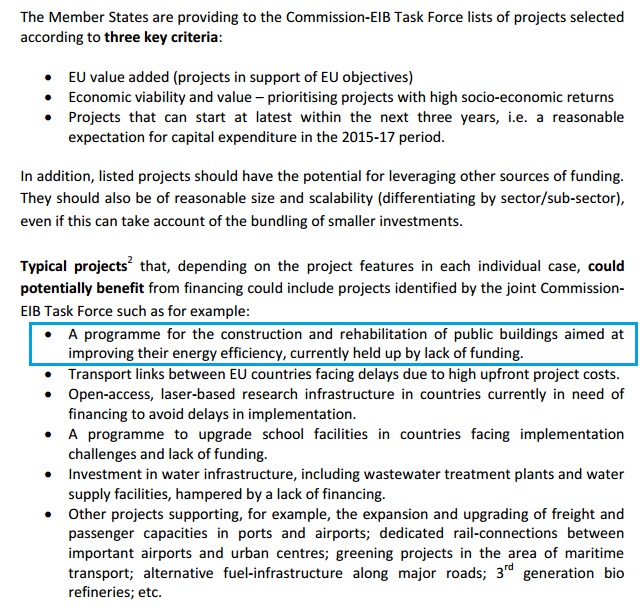Juncker Plan
SFTE and the European Fund for Strategic Investments (EFSI)
There are many similarities between the SFTE project and the European Fund for Strategic Investments (EFSI) which will be set by the European Commission (EC) in partnership with the European Investment Bank (EIB). Indeed, the ESFI will ”be built on a guarantee of € 16 billion from the EU budget, combined with € 5 billion committed by the EIB.” In this context, the financial institution that gives its guarantee to renovation projects is no longer the SFTE (the SFTE itself being guaranteed by the French state in the synthesis report of the study), but it is the EFSI which provides the same type of high-quality guarantee. The structuration of the EFSI guarantee (“first-loss”) is the same as what had been proposed in our report (source: European Commission. Press release. EU launches Investment Offensive to boost jobs and growth. 4th November 2014). In addition, according to European Commission estimates, the proposed measures taken as a whole could add € 330 – € 410 billion to EU GDP over the next three years and create up to 1.3 million new jobs. The energy renovation of public buildings could bring a significant contribution to this.
Selection of the energy renovation of public buildings in the Juncker Plan
In its communication on the Juncker Plan, the European Commission has identified programmes for the energy renovation of public buildings as typical projects that could benefit from financing. There are currently no financing commitments by the European Commission or the EIB for any projects, but the energy renovation of public buildings has been clearly identified by the joint Commission-EIB Task Force (see below).
Support of other countries to similar projects
Other Member States of the European Union have decided to support the energy renovation of public buildings under similar projects. They include the United Kingdom and Italy.
SFTE as part of President Juncker’s investment plan: socio-economic benefits
Energy renovations bring key socio-economic benefits which would be highly valuable in the context of the Juncker Plan:
- local job creation, in part through SMEs: with about 15 jobs/year per million euros invested, a €420bn programme of investment in public buildings would result in more than 600,000 additional jobs/year over 10 years;
- the development of an industry of excellence which would boost EU exports to globally expanding energy efficiency markets;
- improvement of the EU’s highly skewed energy trade balance;
- energy independence[1]: the EU28 imports more than 50% of the energy it consumes and the Ukraine crisis is currently underlining Europe’s vulnerability;
- investment spurring the EU’s competitiveness: fossil-fuel imports represent more than €1bn per day but energy savings would enable the EU to use these resources to generate more added value;
- exemplary reduction of CO2 emissions in the context of COP21, in accordance with European targets[2].
Investing €180bn in public buildings (+€120bn versus BAU) would reduce their energy consumption by 20%. Investing €420bn (+€360bn versus BAU) would reduce their CO2 emissions by 40%.
[1] Energy consumption for heating in public buildings: 50% gas and 20% fuel oil (France).
[2] European Commission. 2020 climate and energy package and 2030 framework for climate and energy policies.
Downloads
The following documents can be downloaded in English for more details:


